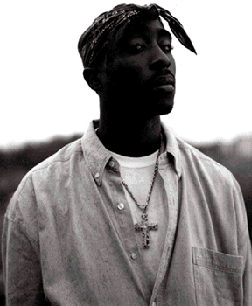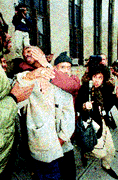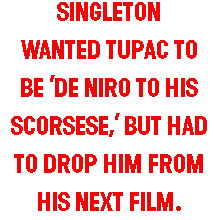



"He's what they call a natural," says John Singleton, the writer-director of Boyz N the Hood and Poetic Justice. "You know, he's a real actor. He has all these methods and everything, philosophies about how a role should be played."
The critical acclaim Tupac received for his role (The New York Times called him "the film's most magnetic figure"), and the release of his debut album, 2Pacalypse Now, signaled the beginning of a new phase in Tupac's life. "I loved the fact that I could go to any ghetto and be noticed and be known." It also marked a new reason to exist: Thug Life.
On a balmy September day at the Marcus Garvey School in South Central Los Angeles, Tupac stands before a room full of teachers and administrators, mostly women, and explains Thug Life. "It's a double finger when you see people dressing like this," he says, pointing to his sagging jeans, pushing them down for extra emphasis. I scan the audience and everyone is listening intently. "Thug Life" is what Tupac calls his mission for the black community-a support group, a rap act, and a philosophy. Thug Life was given its acronym after the fact: The Hate U Gave Lil Infants Fuck Everybody.
"But why be a thug?" an elderly man asks.
"Because if I don't, I'll lose everything I have. Who else is going to love me but the thugs?"
I think of Tupac's music: It's a cross between Public Enemy and N.W.A, between Black Power ideology and "Fuck tha Police!" realism. When he raps, Tupac is part screaming, part preaching, part talking shit. The music is dense and, at times, so loud it drowns out the lyrics. You cannot dance to it. Perhaps that is intentional.
"Nobody can talk about pain like Tupac. No one knows it like me," he
says. "It separates me from other rappers. All that pain I'm talking about
in my rap, you can see it." All too clearly sometimes. Apparently, it is
not just something he works out in his music or in his acting-it's something
he carries into his relationships with women, with his peers, with authority
figures. He seems incapable of separating art from life. 
First, there was Oakland: In 1991, Tupac was arrested for jaywalking and resisting arrest, and has a $10 million claim against the police for alleged brutality. Then, in 1992, during a confrontation with old acquaintances at a festival celebrating Marin City's 50th anniversary, a six-year-old boy was shot in the head. No criminal charges have been filed against Tupac, but a civil suit is pending. Later that year, a Texas woman filed a multimillion-dollar civil suit against him, claiming that the young black man who killed her husband-a cop-had been influenced by Tupac's music.
Then there is 1992's In Living Color incident. Tupac had just arrived at the Fox lot to tape a segment when he claims his "limo driver disrespected my homeboy, screaming at him like he was less than a man. Then the limo driver went to his trunk. We didn't know if the guy was getting a gun or what." Tupac and his friend jumped out of the car and allegedly attacked the driver. Tupac was arrested but the charges have been dropped.
Finally, a year ago, Tupac got into a fight with directors Albert and Allen Hughes over the loss of his role in Menace II Society. The Hughes brothers will not comment on the case. Tupac, however, has a lot to say.
"They was doin' all my videos," he says. "After I did Juice, they said, `Can we use your name to get this movie deal?' I said, `Hell, yeah.' When I got with John Singleton, he told me he wanted to be `Scorsese to your De Niro. For starring roles I just want you to work with me. So I told the Hughes brothers I only wanted a little role. But I didn't tell them I wanted a sucker role. We was arguing about that in rehearsal. They said to me, `Ever since you got with John Singleton's shit you changed.' They was trippin' 'cuz they got this thing with John Singleton. They feel like they competing with him."
The Hughes brothers dropped Tupac from Menace (Tupac says he found out watching MTV), and then, a few months later, ran into him at the taping of a Spice1 video. Tupac stepped to the twins ("That's a fair fight, am I right? Two niggas against me?"), hit Allen, and Albert ran off. Allen's civil suit against Tupac was still pending as VIBE went to press.
When I spoke with John Singleton in September about Tupac's problems, he said, "Everybody needs to fuckin' chill out and understand that this is a black man that's still tryin' to grow, you know?" By December, Singleton, who Tupac considers his "one friend in Hollywood" and was planning to cast the rapper as the lead in his next film, Higher Learning, was forced by Columbia Pictures to drop his star because of Tupac's recent arrests in Atlanta and New York. "Basically, since all this stuff is happening, the media is trying to play `good nigga vs. bad nigga' and say I don't want him in the movie," Singleton says. "That ain't true. In their minds, it doesn't matter if he's guilty or not. They don't want nothin' to do with him. I talked to Tupac and said, `I still got your back.'"
 Atlanta
is considered the black mecca for the '90s. It is here that black folks
can own businesses and homes, run city government, attend historically
black colleges, create a thriving music industry à la L.A. Reid
and Babyface, Dallas Austin, and Jermaine Dupri, and feel empowered. It
is also here that Tupac's manager decided to purchase a home for his client,
"So he can have a calmer life."
Atlanta
is considered the black mecca for the '90s. It is here that black folks
can own businesses and homes, run city government, attend historically
black colleges, create a thriving music industry à la L.A. Reid
and Babyface, Dallas Austin, and Jermaine Dupri, and feel empowered. It
is also here that Tupac's manager decided to purchase a home for his client,
"So he can have a calmer life."
But on October 31, just a few days after moving in, Tupac was arrested for allegedly shooting two white off-duty police officers, brothers Mark and Scott Whitwell. The Whitwells were in the midst of a traffic-related argument when Tupac and his entourage pulled up. What happened next remains unclear. The Whitwells say Tupac fired at them; other witnesses say Mark Whitwell was the first to pull a gun. Tupac contends that he was merely coming to the aid of a black man the Whitwells were harrassing. Charged with two counts of aggravated assault and released on bail, Tupac and his attorneys maintain he and his associates were acting in self-defense. On the day of Tupac's hearing, Mark Whitwell was charged with aggravated assault, and the investigating detective admitted the officers' report stated that "niggers came by and did a driveby shooting."
The sexual-assault case in New York is more complicated. The details are sketchy (for legal reasons, not much can be said by either side), but according to Tupac and his lawyers, they are these: Tupac and several friends went to the club Nell's on Sunday, November 14, and it was there that he met the 20-year-old woman who almost immediately "rubbed his sides on the dancefloor." Shortly thereafter, according to defense eyewitnesses, the young woman then engaged in oral sex with Tupac ("I never got my dick sucked in public. That was a new one for me"), and subsequently went back to Tupac's hotel where they had consensual sex.
"She called me every day after and I was scared, 'cuz she was coming on so hard," says Tupac. "What she said happened did not happen. I never touched her. I feel like somebody's setting me up because I'm Tupac Shakur. My mother was a Panther. It's based on what they did and what I'm doing."
Throughout his life, Tupac has been struggling to define himself: First as the son of a radical political activist, then as the son of a gangster, then as an outcast in Marin City, and, finally, as a rapper and movie star living the self-described "Thug Life." Like many young black men, his struggle has been outright rebellion-both internal and external-against a life he sees as stacked against him. I look at Tupac and I see myself, my homeboys, all the brothers I've ever encountered, trying to prove ourselves to the world. But I wonder why Tupac's efforts to validate his existence are so destructive. Over the past several months, as the media reported one violent incident after another, many people asked, "Is Tupac on a self-destructive mission? Does he have a deathwish? Is he crazy?" Ultimately, though, those are the easiest questions to ask. The tougher ones-about race and class in America-no one wants to think about.
Back at his home outside Atlanta, a mellow Tupac bites off a sliver of his thumbnail and spits it on the floor. "These are life-moving type things," he says. "Some days I wake up and it wouldn't take nothin' for me to go, `POW!'" He points an imaginary gun at his head. "But I wouldn't do that because I don't want no one to think that's the way to go." Tupac stares across his barely furnished living room. He reaches for his pack of cigarettes, lights one, then sucks in hard.
"It was all right with the police thing [in Atlanta], but this rape shit..." He draws in a deep breath. "It kills me." A pause. "'Cuz it ain't me." His voice rises and he grows visibly angry. "What was all that `Keep Ya Head Up,' `Brenda's Got a Baby'? What was all that for? To just be charged with rape?" He seems close to tears.
"I love black women," he continues. "It has made me love them more because there are black women who ain't trippin' off this. But it's made me feel real about what I said in the beginning: There are sisters and there's bitches." I ask him if he thinks he'll beat the Atlanta and New York cases.
"If they keep doin' me like that in the press, I'ma lose 'cuz the jury gonna believe everything they been reading. If they give me a chance, I'm not just gonna walk to jail." He sighs.
"My spirit would die and that's all I got. I'd be another statistic." He turns upbeat. A smile creases his face. "I got faith in God. I don't believe God brought me this far to crucify me like this. I believe he's doin' this just to make me stronger."
"What about being more careful?" I ask, and he becomes animated.
"Where do I go to stay out of trouble? That's why I came to Atlanta. What do they want me to do? There's not a place called `Careful.' I'm accessible, doin' street rallies, just to let niggas know I'm here. That's why I'm gettin' into trouble."
He laughs half-heartedly. I ask him about death.
"Ever since I was a kid I been dreaming about dying saving somebody. I feel like I'll probably die saving a white kid." I laugh.
"I'm serious!" he yells, his long arms slicing the air to underline
his point. "I see me dying...getting shot up for a white kid. In my death,
people will understand what I was talking about. That I just wasn't on
some black-people-kill-all-the-white-people shit."